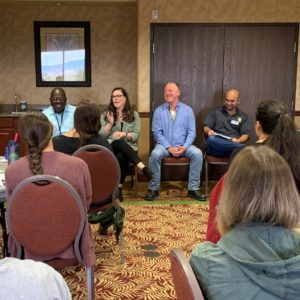By: Nakasha Shoyinka, ASU Food Policy and Sustainability Leadership Certificate student.
The leafy green city of Yuma, AZ was a sight to see and provided so much information about agriculture practices in southern Arizona. The ASU Food Policy and Sustainability cohort was given the honor to have a panel discussion with four amazing individuals who work for the USDA in different capacities. After having a filling breakfast, we had an up close and personal chat with Mike Stevens (FSA), Raney Embree (FSA), Valentino Reyes (NRCS), and Godfrey Hinds (Rural Development). We asked questions and gained insight about the different roles and positions the USDA has on impacting farmers, the land, and conservation.
Mike and Raney both work for the Farm Service Agency where they implement agricultural policy, administer credit and loan programs, and manage conservation, commodity, disaster and farm marketing programs. FSA supports programs like Future Farmers of America and 4H which help develop the youth’s potential for leadership, personal growth, and career success through agricultural education.
FSA has created a youth loan program for individual young persons to start and operate income-producing projects of modest size in connection with their participation in 4-H clubs, FFA, a Tribal youth group, or similar agricultural youth organizations.
Some use the loans to raise and show animals in competitions. These loans have allowed them to develop a sense of responsibility in addition to building their credit history in order to be eligible for other loans as they get older.
Valentino Reyes works for the National Resources and Conservation Center where in my capacity of work with farmers, I have implemented classes in collaboration with NRCS to help farmers maintain the natural resources our planet provides- most specifically soil.
The most interesting USDA representative was Godfrey Hinds, the area Director for Rural Development. He works for a department that we were all surprised was connected to the USDA, but when he explained that rural development is on the rise, we all shook our heads in agreement. We tend to forget rural areas, economies, and how economic devastations like recessions affect rural areas first. Mr. Hinds explained to us that the USDA offers loans and incentives for individuals who would like to purchase, remodel or improve a home, or open a small business in a rural area.
As the panel discussion came to a close, I took the opportunity to talk to Mr. Hinds about his impact and drive to stay in his line of work for so many years and his reason for moving from Tifton, Georgia, to southern Arizona. His answer was simple: he saw a need.
